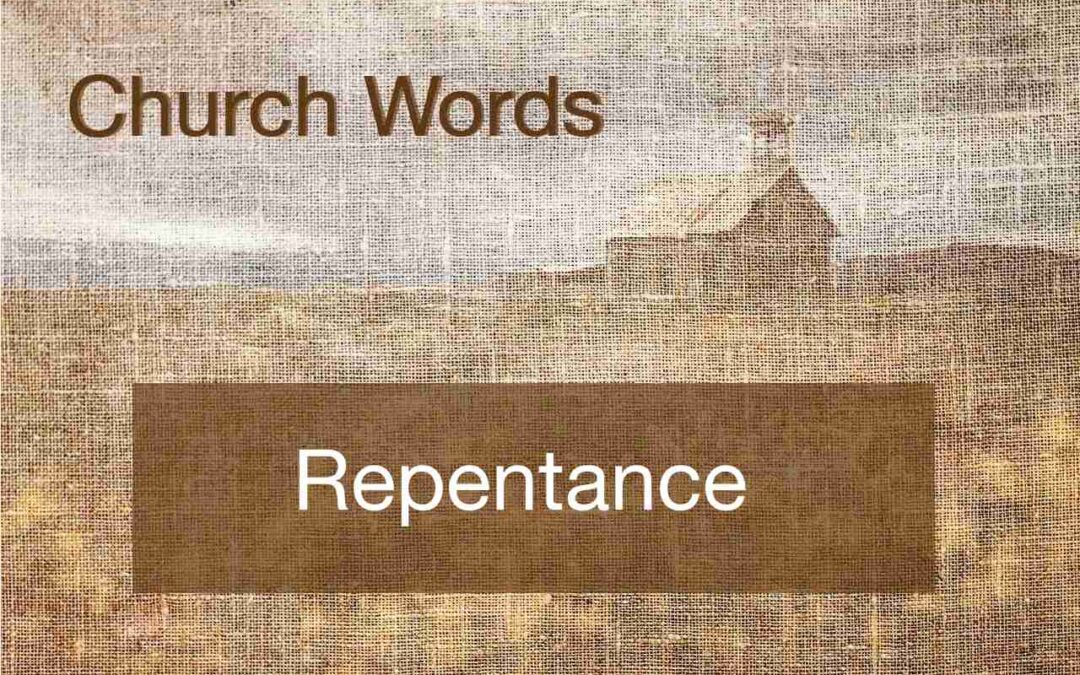In the Old Testament the word, niham, translated “metanoeo” in the Greek, becomes “repent” in English. It typically describes an action by God (e.g. God repented or relented and did not destroy his disobedient children). New Testament usage of metanoeo or variations of it refers to actions by humankind. The first part, “meta,” is a prefix meaning change. The second part “noeo,” describes how one perceives and responds to reality; what they see. Consequently, the compound word describes change and worldview. It means: ’to think differently after’ or to “perceive afterwards.” In repenting, a person literally changes direction. He or she turns around and adopts a new worldview. They stop following the patterns of the world and strive to be like Jesus. True repentance is observable. Jesus said you can tell if a person has truly repented by watching what they do, if they, “Produce fruit in keeping with repentance” ( Matthew 3:8 | NIV). Observable actions demonstrate transformation. We are no longer who we were and it shows.
Repentance is simply turning from the world’s darkness and toward the light of Jesus. If you are a visual learner, here is a simple example to assist in understanding it that I adapted from the metanoia.org website. Imagine you are standing in a circle of people in a dark room, facing away from the center. There is a light source in the middle of the circle. Everyone is facing it but you. You can’t see anyone else. All you can see is your indistinct shadow on the wall. But, if you turn around, you can see the light and the faces of the others in the circle. Compared to your shadow, you see them clearly. Jesus is the light. We can only really see him and others by turning away from the darkness and toward him. The Holy Spirit gives us 2020 spiritual vision. It means thinking differently about everything and everyone. We become more observant and acutely aware of what we say, feel and do, especially as it relates to others. True Jesus-followers measure themselves only against Christ’s words and actions.
The first beatitude is foundational to coming to God through Jesus. “Blessed are the poor in spirit, for theirs is the kingdom of heaven” (Matthew 5:3 | NIV). Jesus is concerned with the spiritual condition of those who follow him; specifically that they recognize how spiritually poor they really are. It is only when they realize their spiritual tank is empty that they are ready to have it filled by the Holy Spirit. The infilling of the Holy Spirit must be preceded by an awareness they are separated from God and become overwhelmed by a conviction that something within them must change. But that compels them to realize they can’t do it without help.
The second beatitude describes the proper response and reward for genuine repentance. “Blessed are those who mourn, for they will be comforted” (Matthew 5:4 | NIV). In his book Studies in the Sermon on the Mount, D. Martyn Lloyd-Jones viewed Christ’s reference to mourning from an individual, sinner’s perspective. “Those who are going to be converted and wish to be truly happy and blessed are those who first of all mourn. Conviction is an essential preliminary to true conversion.” He further asserted that the Christian mourns for his or her sins and the sins of others, along with the damage sin introduced into the world. True repentance carries with it godly sorrow and the manifestation of that sorrow is the mourning for which Jesus promises comfort. “Godly sorrow brings repentance that leads to salvation and leaves no regret, but worldly sorrow brings death” (2 Corinthians 7:10 | NIV).
Repentance and belief are inextricably linked. Repentance is not feeling bad or guilty because you got caught doing something that God doesn’t like. It is a recognition that you are eternally separated from God. Belief is necessary for God to dispense his grace by forgiving your sins. Belief exercised by faith saves us. “Now faith is confidence in what we hope for and assurance about what we do not see” (Hebrews 11:1 | NIV). Jesus said, “The kingdom of God has come near. Repent and believe the good news!” (Mark 1:15 | NIV) The heart of the good news of the gospel is, even though you cannot restore your relationship with God, Jesus has already done it for you.“For God so loved the world that he gave his one and only Son, that whoever believes in him shall not perish but have eternal life” (John 3:16 | NIV). We are saved by grace alone through faith alone in Christ alone. “For it is by grace you have been saved, through faith—and this is not from yourselves, it is the gift of God—not by works, so that no one can boast” (Ephesians 2:8-9) | NIV).
